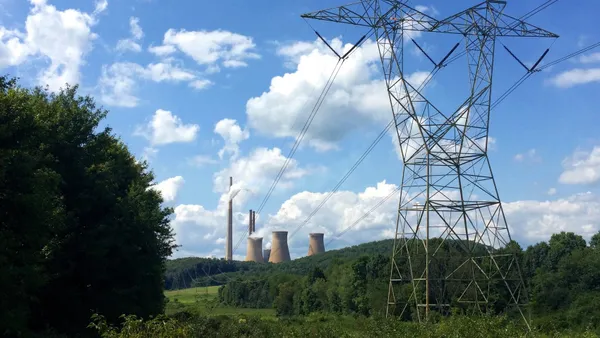Dive Brief:
- The Electric Power Supply Association has made two filings asking federal regulators to take action on nuclear subsidies passed in New York last year, calling them a clear overreach and requesting the Federal Energy Regulatory Commission to take mitigating actions.
- Generators last year filed a lawsuit challenging nuclear subsidies approved by the New York Public Service Commission, arguing they intrude on federal jurisdiction of wholesale markets.
- On the same day EPSA filed with federal regulators, the coalition of generators also petitioned the Southern District of New York urging a quick trial on the state's zero-emissions plan.
Dive Insight:
The fight over New York's zero emission credit (ZEC) program, which aims to save three struggling nuclear plants in the upstate region, has come under increasing fire from generators who say it distorts wholesale markets and is a scheme courts have already struck down.
EPSA President John Shelk said in a statement that the group was asking FERC to move quickly "to protect
wholesale markets from the corrosive effects of ZECs." The group's complaint also addresses actions taken in Illinois, which they said could impact PJM markets. Shelk wants FERC to adopt a minimum offer price rule (MOPR) for existing units bidding into the New York and PJM markets.
The Fitzpatrick, Ginna and Nine Mile nuclear plants are expected to produce 27.6 million MWh of carbon-free generation annually, helping the state in its goal to cut greenhouse gas emissions 40% from 1990 levels by 2030. But cheap gas has forced the plants to consider premature closure, leading the state to intervene to try and save the upstate plants.
A fourth nuclear plant, Indian Point, operates near New York City and is not a part of the ZEC program. Owner Entergy recently announced an agreement with Gov. Cuomo's office to shutter the facility by 2021.
In their lawsuit, generators say the U.S. Supreme Court has blocked arrangements that essentially set a floor price for state-incentivized generation. At the heart of their complaint is the Hughes v. Talen Energy Marketing decision, which focused on a Maryland program designed to support a new gas plant. Arguments against New York's ZEC program are essentially the same: in the Maryland case, contracts stipulated a rate and directed the plant's developer to bid the capacity into the PJM market.
New York's Public Service Commission however has defended its ZEC plan, saying the plan was "carefully designed" to not intrude on FERC's jurisdiction. But still, the generators call the plan an "existential threat" to wholesale markets.
“The profound adverse economic effects of ZECs and similar out of market payments on the viability and
integrity of wholesale markets that millions of consumers depend on is not in dispute," Shelk said. "This is an existential threat to markets that cries out for effective action through a minimum offer price rule on existing units."
EPSA noted that while it asking FERC to implement mitigation measures, the group is not asking for a decision on a separate question, already in federal court, of whether ZECs are preempted by the Federal Power Act.
“The Supreme Court has repeatedly held that States may not take action that directly affects the wholesale electric market, and that is precisely what the ZEC program will do and was expressly intended to do” Jonathan Schiller, a managing partner of Boies, Schiller & Flexner, attorneys for the generators, said in a statement. “This illegal subsidy only fulfills the PSC’s intended purpose if it keeps afloat inefficient nuclear plants that were going out of business.”














